- Home
- Conn Iggulden
The Field of Swords Page 9
The Field of Swords Read online
Page 9
“We’re nearly home,” Teddus said clearly, more for the benefit of the men at the corner than Alexandria, who knew the streets as well as he did. He sounded unworried, and kept the long blade at his side as they moved past them. It was too dark to see their faces, but Alexandria could smell the dampness of wool and sour garlic. Her heart thudded as a shadow jarred her shoulder, making her stumble. Teddus’s son guided her away with his sword hand, showing them the blade as he did. They didn’t move and Alexandria could feel the threatening stares as the moment hung in the balance. One slip and they would attack, she was sure, her heart beating at painful speed.
Then they were through and Teddus took her arm in a tight grip, his son on the other side.
“Don’t look back at them, miss,” Teddus muttered softly.
She nodded, though she knew he couldn’t see her. Were they following, trotting behind them like wild dogs? She ached to look over her shoulder, but Teddus bore her on through the streets, pulling her away. His limp was getting worse and his breath was labored with pain as they left the corner behind. He never spoke of it, but his right leg had to be rubbed with liniment each night just to hold his weight in the morning.
Above them, the rain pounded on the roofs of houses packed with people who knew better than to be out on the streets after dark. Alexandria risked a glance behind, but could see nothing and wished she hadn’t. Anger stirred in her then. The Senate did not have to fear as she did. They never moved without armed guards and the raptores avoided them, recognizing the presence of a greater threat than they could deal with. The poor had no such protection, and even in the daylight there were thefts and sudden skirmishes in the streets that left one or two dead and the rest walking stiffly away, knowing they would not be caught or even chased.
“We’re nearly there, miss,” Teddus said again, this time meaning it.
She heard the relief in his voice and wondered what would have happened if the group had drawn their knives. Would he have died for her, or left her to the mercy of the gang? It was impossible to know, but she calculated the cost of hiring another guard to join them. And who would watch him?
Another two turnings brought them to her own street. The houses were larger than the maze they had walked through, but the slurry of filth was thicker if anything, swollen by the rain. She grimaced as a splash of it reached up under her stola to her knee. Another pair of sandals ruined. The leather would never smell clean again, no matter how often she soaked them.
Grunting slightly in pain, Teddus reached her door first and thumped on it. They waited in silence, the two men glancing up and down the street in case anyone was waiting to rush in after them. That had happened to someone only a few nights before in a street not far away from where she lived. No one had dared to come out to help.
Alexandria could hear footsteps approach from the other side.
“Who’s there?” came Atia’s voice, and Alexandria breathed out slowly in relief at being home. She had known the woman for years, and Atia was the closest thing she had to family in Rome, though she lived in the house and served as Alexandria’s cook.
“It’s me, Ati,” she said.
Light spilled out as the door opened and they moved in quickly, Teddus waiting until she was off the street before following. He replaced the locking bar carefully and then finally sheathed his knife, the tension easing out of his shoulders.
“Thank you, both of you,” Alexandria said.
The son was silent, but Teddus grunted a reply, patting his hand against the solidity of the door as if for reassurance. “It’s what we’re paid for,” he said.
She saw his weak leg was slightly raised as he stood without putting weight on it, and her heart went out to him. There were different kinds of courage.
“I’ll bring you a hot drink after you’ve seen to your leg,” she said.
To her surprise, he blushed slightly. “No need for that, mistress. Me and the boy will look after ourselves. Perhaps later.”
Alexandria nodded, unsure whether she should try again. Teddus seemed uncomfortable with anything approaching an offer of friendship. He appeared to want nothing more from her than regular pay, and she had accepted his reserve. Tonight, though, she was still shaken and needed people around her.
“You must be hungry and there’s cold beef in the kitchen. I’d be pleased if you would eat with us when you’re ready.”
Atia shifted her feet and Teddus looked at the floor for a moment, frowning slightly.
“If you’re sure, mistress,” he said at last.
Alexandria watched as the two men made their way to their own rooms. She looked at Atia and smiled at the woman’s stern expression.
“You are too kind to those two,” Atia said. “There’s little good in either of them, father or son. If you let them have the run of the house, they’ll take advantage, I’m sure of it. Servants should not forget their place, nor those who pay them.”
Alexandria chuckled, the fear of the evening beginning to ease. In theory, Atia was a servant herself, though they never mentioned it. Alexandria had known her first when she went looking for clean rooms in the city, and when her jewelry business had grown Atia had come with her to the new house to run it for her. The woman was a tyrant with the other servants, but she made the place feel like a home.
“I’m glad they were with me, Atia. The raptores were out early with the storm, and a cup or two of hot wine is fair pay for safety. Come on, I’m starving.”
Atia sniffed rather than reply, but overtook her in the corridor as they walked toward the kitchen.
The Senate building was filled with the light of dozens of spluttering lamps around the walls. The echoing hall was warm and dry despite the muted drumming of the rain outside, and few of the men present relished the thought of getting wet on the way to their homes. The afternoon had been taken over with the reports on the city budget, with a string of votes to approve vast sums for the legions keeping the Pax Romana in distant lands. The sums were daunting, but the reserves were healthy enough to tide the city over for another year. One or two of the more elderly senators had let the warmth lull them to dozing, and only the storm outside held them from making their way to late meals and their own beds.
Senator Prandus stood at the rostrum, his gaze sweeping along the semicircular rows of benches, looking for support. It annoyed him that Pompey sat muttering to a colleague while Prandus announced his candidacy for the seat of consul. It was at Pompey’s request that he had agreed to put his name forward, and the least the man could do was look attentive.
“If I am elected to the post, I intend to gather the coin makers under a single roof and establish a currency on which the citizens can depend. There are too many coins that only claim to be gold or pure silver, and every shop has to have its own scales to weigh the money they are given. A single Senate mint will end the confusion and restore trust.”
He saw Crassus frown and wondered if he was responsible for some of those false coins that caused so much damage. It would not surprise him.
“If the citizens grant me the right to sit as consul, I will act in the interests of Rome, restoring faith in the authority of the Senate.” He paused again as Pompey looked up, and Prandus realized he had made a mistake. Someone chuckled and he felt himself growing flustered.
“. . . greater faith in the Senate,” he added. “Respect for authority and the rule of law. Justice that must be seen to be free of bribery or corruption.” He paused again, his mind going blank.
“It will be an honor to serve. Thank you,” he said, stepping down from the rostrum and taking his seat in the front bench with evident relief. One or two of the men closest to him clapped him on the shoulder, and he began to relax. Perhaps the speech hadn’t been too bad after all. He glanced at his son Suetonius to see how he had taken it, but the young man was gazing stonily ahead.
Pompey walked down between the benches and smiled at Senator Prandus as he passed him. Those who had begun whispered conver
sations fell silent as the consul stepped up to the rostrum. He looked relaxed and confident, Prandus thought with a touch of irritation.
“I thank the candidates for their words,” Pompey said, allowing his eyes to rest on the men in silent recognition before continuing. “It gives me hope that this great city can still find those willing to devote their lives to her without thought of personal gain or ambition.” He waited through the appreciative chuckle, leaning forward and resting on his arms.
“The election will give my builders a chance to enlarge this place, and I am willing to give the use of my new theater while the work goes on. It should be adequate, I think.” He smiled at them and they responded, knowing the theater was twice as large as the Senate building and at least twice as luxurious. There were no objections.
“As well as those we have heard here, any other candidates must declare before the feast of Volturnalia, ten days from now. Let me know in good time, please. Before we dare the rain, I must announce a public gathering in the forum a week from now. The trial of Hospius will be postponed for a month. Crassus and I will give the consuls’ address to the people then. If any of the other candidates would like to add their voices to ours, you should see me before I leave tonight.”
Pompey caught Prandus’s eye for a brief moment before moving on. It had all been arranged and Prandus knew his candidacy would be strengthened by association with the more experienced men. He had better practice his speech. For all Pompey’s promises, the crowds of Rome could be a difficult audience.
“The day is at an end, Senators. Rise for the oath,” Pompey said, his voice raised to be heard over the rain that battered the city.
The storm lasted for three days, sweeping over the scattered ships and toward their destination. When it had passed, the fleet carrying the Tenth slowly gathered again, each one a hive of activity as they made repairs to sails and oars and heated tar to dribble between the wide planks of the decks where water had leaked through. As Brutus had predicted, Julius signaled the fleet to anchor outside Ostia, and the small boats moved between them, carrying supplies and carpenters and making sure that they would stand up under scrutiny. The sun baked the decks dry and the Tenth washed out the holds of the ships, cleaning away the smell of vomit with seawater and white grease.
When the anchors were winched up and scrubbed clean of clay, they moved into the port, with Julius at the bow of the first ship. He stood with one arm wrapped around the high prow, drinking in the sight of his homeland. Looking back over his shoulder showed him the white wings of the oared vessels making an arrowhead behind him, with the sails of the others bringing up the rear. He could not have put his feelings into words if he’d been asked, and didn’t try to examine them. His headaches had vanished in the fresh sea wind, and he had burnt incense in a brazier in thanks to the gods for the safe passage through the storm.
He knew the Tenth could make a permanent camp in the fields beyond the port while he took the road to the city. The men were as excited as the officers at the chance to see families and friends again, but there would be no leave granted until the camp was set up and secure. Five thousand men were too many to descend on his estate. Just feeding such a number caused problems, and the prices were better at the docks. Like locusts, the Tenth could eat away the gold he had brought if he let them. At least they would be spending their own pay in the city inns and whorehouses.
The thought of seeing his estate brought a mixture of grief and excitement to him. He would see how his daughter had grown and walk by the river his father had dammed to flow through the estate. Julius’s smile faded as he thought of his father. The family tomb was on the road into the city, and before anything else, he had to see the graves of those he had left behind.
CHAPTER 8
_____________________
Crassus breathed in the steam from the pool as he eased himself in up to his waist. The marble sill was icy against his shoulders as he sat on the inner step, and the contrast was exquisite. He felt the knots of tension in his neck and waved a hand to summon a bath slave to massage them away while he talked.
The other men in the pool were all his clients and loyal beyond the monthly stipend they received. Crassus closed his eyes as the slave’s hard thumbs began to worry at his muscles and sighed with pleasure before speaking.
“My term as consul has made little mark on the city, gentlemen.” He smiled wryly as the men with him shifted in consternation. Before they could protest, he continued. “I thought I would have done more in my time. There are too few things I can point to and say ‘That was mine, alone.’ It seems renegotiated trade agreements are not what stirs the blood of our citizens.”
His expression became tinged with bitterness as he looked at them and traced a swirl in the surface of the water with a finger.
“Oh, I gave them bread when they said they had none. But when the loaves were gone, nothing had changed. They have had a few race days from my purse and seen a temple restored in the forum. I wonder, though, if they will remember this year, or ever think of me when I was consul.”
“We are for you,” one of the men said, the sentiment quickly echoed by the others.
Crassus nodded, breathing his cynicism into the steam. “I have won no wars for them, you see. Instead, they fawn on Pompey and old Crassus is forgotten.”
The clients did not dare to meet each other’s faces and see the truth of the words reflected there. Crassus raised his eyes at their embarrassment before going on, his voice firming with purpose.
“I do not want my year to be forgotten, gentlemen. I have bought another day at the racetrack for them, which is a start. I want those who rent from me to be given first choice of tickets, and try to get families.” He paused to reach behind his head for a cup of cool water, and the slave interrupted his kneading to pass it into the bony fingers. Crassus smiled at the lad before continuing.
“The new sesterces with my head on them are ready. I will need you all to manage the distribution, gentlemen. They are to go only to the poorest of homes and no more than one to each man and woman. You will have to employ guards and take only small amounts with you at a time.”
“May I mention an idea, Consul?” a man asked.
“Of course, Pareus,” Crassus replied, raising an eyebrow.
“Hire men to clean the streets,” he said, the words spilling out too quickly under the consul’s gaze. “Much of the city is stinking and the people would thank you for it.”
Crassus laughed. “If I do as you say, will they stop throwing their filth on the roads? No, they will say, let fly, for old Crassus will come after us with buckets to clean it up again. No, my friend, if they want clean streets, they should get water and cloths and clean them up themselves. If the stench grows too bad in summer, they may be forced to, and that will teach them to be clean.” Crassus saw the man’s disappointment and said kindly, “I admire a man who thinks the best of our people, but there are too many who lack the sense not to foul their own steps. There is no sense in courting the goodwill of such as they.” Crassus chuckled at the thought for a moment, then fell silent.
“On the other hand, if it was popular . . . no. I will not be known as Crassus the cleaner of shit. No.”
“The street gangs, then?” Pareus went on stubbornly. “They are out of control in some areas. A few hundred men with permission to break the gangs would do more for the city than—”
“You want another gang to control the others? And who would keep them in control? Would you ask for a still larger group to handle the first?” Crassus tutted to himself, amused by the man’s persistence.
“A legion century could . . .” the man stammered.
Crassus sat up, sending a ripple out over the pool. He held up a hand for silence and his clients shifted nervously.
“Yes, Pareus, a legion could do many things, but I do not have one at my call, as you should perhaps have remembered. Would you have me beg more soldiers from Pompey to patrol the poor areas? He asks for fortu
nes just to have guards at the races, and I have had my fill of bolstering his reputation with my gold.” Crassus swung his hand out and knocked the metal cup spinning over the tiles of the bathhouse.
“Enough for now, gentlemen. You have your tasks for the moment and I will have more for you tomorrow. Leave me.”
The men climbed out of the pool without a word, hurrying away from their irascible master.
Julius was pleased to leave the noise of the port behind him as he and Octavian took the road to the city. With Brutus overseeing the unloading of men and equipment, the work would be quickly finished. The centurions had been chosen personally and they could be trusted to keep the men on a tight rein until the first groups were allowed to take their leave.
He glanced at Octavian and noted how well he sat his horse. Training with the extraordinarii had schooled his wildness, and he rode now as if he had been born in the saddle, not as a street urchin who hadn’t seen a horse until he was nine years old.
They walked the mounts on the worn stones of the road into the city, guiding them around the carts and slaves who hurried along it on unknown errands. Grain and wine, precious stones, leather hides, tools of iron and bronze, a thousand other things that were destined for the hungry maw of the city ahead. The drivers flicked their whips with skill over oxen and asses, and Julius knew the caravans would extend all the way from the sea to the heart of the markets.
The gentle clopping of the hooves was lulling, but Julius was gripped by a tension that made his shoulders ache. The family tomb was outside the city and he was looking ahead for it, waiting for the first glimpse.

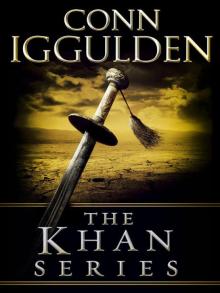 The Khan Series 5-Book Bundle
The Khan Series 5-Book Bundle Tollins 2: Dynamite Tales
Tollins 2: Dynamite Tales Tollins: Explosive Tales for Children
Tollins: Explosive Tales for Children The Field of Swords
The Field of Swords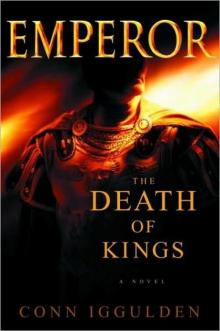 The Death of Kings
The Death of Kings Quantum of Tweed: The Man With the Nissan Micra
Quantum of Tweed: The Man With the Nissan Micra Bones of the Hills
Bones of the Hills Genghis: Birth of an Empire
Genghis: Birth of an Empire The Gates of Rome
The Gates of Rome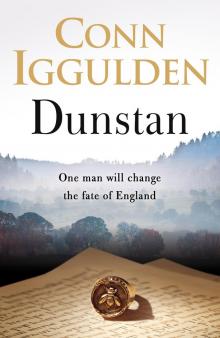 Dunstan
Dunstan Fig Tree
Fig Tree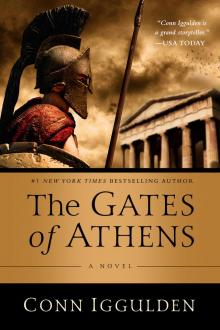 The Gates of Athens
The Gates of Athens Stormbird
Stormbird Khan: Empire of Silver
Khan: Empire of Silver The Abbot's Tale
The Abbot's Tale Gengis: Lords of the Bow
Gengis: Lords of the Bow The Gods of War
The Gods of War Blackwater
Blackwater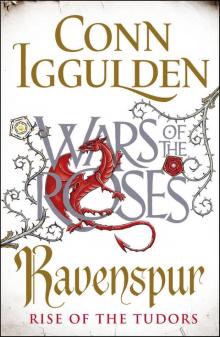 Ravenspur: Rise of the Tudors
Ravenspur: Rise of the Tudors Wars of the Roses: Trinity (War of the Roses Book 2)
Wars of the Roses: Trinity (War of the Roses Book 2) The Gods of war e-4
The Gods of war e-4 The Dangerous Book of Heroes
The Dangerous Book of Heroes Stormbird wotr-1
Stormbird wotr-1 Emperor: The Death of Kings
Emperor: The Death of Kings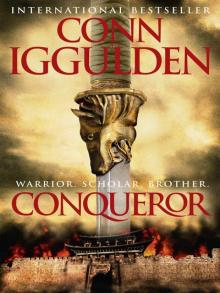 Conqueror (2011) c-5
Conqueror (2011) c-5 The Dangerous Book for Boys
The Dangerous Book for Boys Genghis Lords of the Bow
Genghis Lords of the Bow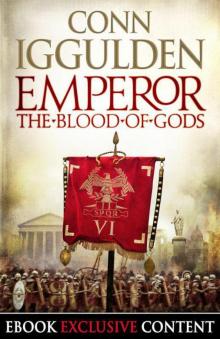 Emperor: The Blood of Gods (Special Edition) (Emperor Series, Book 5)
Emperor: The Blood of Gods (Special Edition) (Emperor Series, Book 5) The Emperor Series: Books 1-5
The Emperor Series: Books 1-5 Lords of the Bow c-2
Lords of the Bow c-2 Lords of the Bow
Lords of the Bow Quantum of Tweed
Quantum of Tweed Wars of the Roses 01 - Stormbird
Wars of the Roses 01 - Stormbird Empire of Silver c-4
Empire of Silver c-4 Birth of an Empire
Birth of an Empire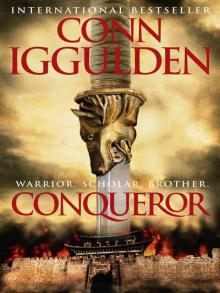 Conqueror (2011)
Conqueror (2011) Wars of the Roses: Bloodline: Book 3 (The Wars of the Roses)
Wars of the Roses: Bloodline: Book 3 (The Wars of the Roses) Bones Of the Hills c-3
Bones Of the Hills c-3 Empire of Silver
Empire of Silver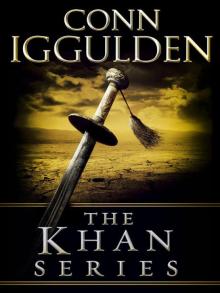 The Khan Series 5-Book Bundle: Genghis: Birth of an Empire, Genghis: Bones of the Hills, Genghis: Lords of the Bow, Khan: Empire of Silver, Conqueror
The Khan Series 5-Book Bundle: Genghis: Birth of an Empire, Genghis: Bones of the Hills, Genghis: Lords of the Bow, Khan: Empire of Silver, Conqueror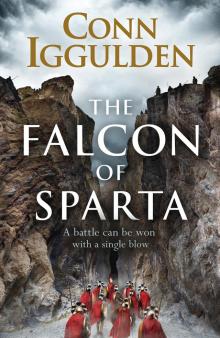 The Falcon of Sparta
The Falcon of Sparta Explosive Tales for Children
Explosive Tales for Children